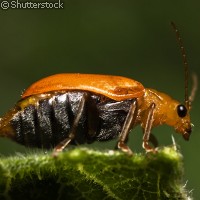EU-funded researchers show link between insect inbreeding and lifespan
A team of EU-funded researchers has discovered that inbreeding can extend the lifespan of male insects. Supported by Marie Curie Fellowships financed by the EU's Sixth Framework Programme (FP6), two independent investigations showed how the consequences of inbreeding differ between male and female bugs. The combined results are published in the journal BMC Evolutionary Biology. The researchers found that inbreeding in Callosobruchus maculatus, a seed beetle that lives in southern India, can result in a longer lifespan in males but shortens the lives of the females. For both sexes, however, inbreeding leads to lower reproductive fitness. 'Sex differences in lifespan are ubiquitous throughout the animal kingdom, but the causes underlying this phenomenon remain poorly understood,' explained Dr Trine Bilde of Uppsala University in Sweden. The new findings are intriguing, as past studies have indicated that, generally speaking, female mammals and insects commonly live longer than males, while males outlive females in most bird taxonomic groups. 'We used sex-specific responses to inbreeding to study the genetic architecture of lifespan and mortality rates in seed beetles,' explained Dr Bilde. The researchers highlighted the 'unguarded X-hypothesis' to explain why the male lifespan is found to be shorter in mammals and insects. Any mutated harmful genes on the X chromosome are expressed in males that have only one X chromosome. Genes that are 'guarded' by the second X chromosome in females are not expressed. But inbreeding should trigger a shorter lifespan in females, while males are less affected. According to the authors, when the two female X chromosomes contain the same version of a gene, which happens more often in inbred insects, the harmful genes are expressed and are therefore considered 'unguarded'. In the current study, the researchers established lines of inbred beetles and compared their lifespans to normal 'outbred' beetles. Results indicated that the female beetles suffered more than males from lifespan reduction, thus confirming the unguarded X-hypothesis. However, the researchers also found that inbreeding resulted in a much longer male lifespan. 'No model based on asymmetrical inheritance can explain increased male lifespan in response to inbreeding,' Dr Bilde noted. The findings support the idea that lifespan is related to reproductive strategy, and differs between the sexes. Because maximum reproductive success varies between males and females, there are bound to be differences between the sexes for the lifespan-fitness relationship, the researchers said. An extended lifespan allows male beetles to spend more time looking for mates. The females could take advantage of a relatively longer lifespan when their time is devoted to caring for offspring. 'The results are consistent with models based on sex-specific selection on reproductive strategies, such that males, in contrast to females, maximise fitness by early and intense investment in reproduction traded off against shorter lifespan,' the study reads. On the one hand, the risk of shortening the lifespan of a male beetle decreases when the male expends less time on male reproductive behaviours; concurrently, this results in reduced fitness. On the other hand, inbred females that save their energy can optimise their reproductive output, but suffer from a shorter lifespan and fitness reduction. 'Our results suggest that differences in lifespan among males and females may result from such sex-specific selection,' Dr Bilde concluded.
Countries
Sweden



